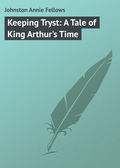
Johnston Annie Fellows
In League with Israel: A Tale of the Chattanooga Conference
The old questions of the Trinity and the Incarnation came back to perplex him, and he put them resolutely away, remembering the words that Bethany had quoted, that when Israel should turn to the Lord, the veil should be taken from its heart.
Suddenly he started to his feet, and with his hands clasped above his head, cried out: "O, Thou Eternal, take away the veil! Show me Christ! I will give up anything – everything that stands in the way of my accepting him, if thou wilt but make him manifest!"
He threw himself on his knees in an agony of supplication, and then rising, walked the floor. Time and again he knelt to pray, and again rose in despair to pace back and forth.
He hardly knew what to expect, but Paul's conversion had been attended by such miraculous manifestations that he felt that some great revelation must certainly be made to him.
Opening the little Testament at random, he saw the words, "If thou shalt confess with thy mouth the Lord Jesus, and shalt believe in thine heart that God hath raised him from the dead, thou shalt be saved."
"I do believe it," he said aloud. "And I will confess it the first opportunity I have. Yes, I will go right now and tell Uncle Ezra – no matter what it may cause him to say to me."
He looked at the clock again. The old year was almost gone. It was nearly midnight. Rabbi Barthold would be asleep. Then he remembered the watch-night service Bethany had asked him to attend. Cragmore and Marion would be there. He would go and tell them.
He started rapidly down the street, saying to himself: "How queer this seems! Here am I, a Jew, on my way to confess before men that I believe a Galilean peasant is the Son of God. I don't understand the mystery of it, but I do believe in some way the promised atonement has been made, and that it avails for me."
He clung to that hope all the way down to the Church. It was growing stronger every step.
Bethany had risen to take her place at the piano at the announcement of another hymn, when the door opened and David Herschel stood in their midst. Not even glancing at the startled members of the League, he walked across the room and held out one hand to Cragmore and the other to Marion. His voice thrilled his listeners with its intensity of purpose.
"I have come to confess before you the belief that your Jesus is the Christ, and that through him I shall be saved."
Then a look of happy wonderment shone in his face, as the dawning consciousness of his acceptance became clearer to him.
"Why, I am saved! Now!" he cried in joyful surprise.
Glad tears sprang to many eyes, and only one exclamation could express the depth of Frank Marion's gratitude – an old-fashioned shout of "Glory to God!" Yes, an old, old fashion – for it came in when "the morning stars sang together, and all the sons of God shouted for joy."
"O, I must tell the whole world!" cried David.
"Come!" exclaimed Cragmore, turning to those around him, and laying his hand on David's shoulder; "here is another Saul turned Paul. Who such missionaries of the cross as these redeemed sons of Abraham? Leagued with such an Israel, we could soon tell all the world. Who will join the alliance?"
In answer they came crowding around David, with warm hand-clasps and sympathetic words, till the bells all over the city began tolling the hour of midnight.
At a word from Cragmore they knelt in the final prayer of consecration.
There was a deep silence. Then the leader's voice began:
"The untried paths of the new year stretch out into unknown distances. But trusting in an Allwise Father, in a grace-giving Christ, and the sustaining presence of the Holy Spirit, how many will sing with me:

"Where He leads me I will follow,
Where He leads me I will follow,
Where He leads me I will follow.
I'll go with Him, with Him all the way."
The melody arose, sweet and subdued, as every voice covenanted with his.
"But some of us may have planned out certain paths for our own feet, that lead alluringly to ease and approbation. Think! God may call us into obscure bypaths, into ways that lead to no earthly recompense, to lowly service and unrequited toil. Can we still sing it? Let us wait. Let us consider and be very sure."
In the prayerful silence, David thought of his profession and the hopes of the great success that it was his ambition to attain. Could he give it up, and spend his life in an unappreciated ministry to his people? He wavered. But just then he had a vision of the Christ. He seemed to see a footsore, tired man, holding out his hands in blessing to the motley crowds that thronged him; and again he saw the same patient form stumbling wearily along under a heavy beam of wood, scourged, mocked, spit upon, nailed to the cross, for – him!
David shuddered, and he took up the refrain: "I'll go with Him, with Him, all the way."
"It may be that, so far as ambition and personal plans are concerned, we are willing to put ourselves entirely in God's hands; but suppose he should call for our hearts' best beloved, are we willing to make of this hour a Mount Moriah, on which we sacrifice our Isaacs – our all? Do we consecrate ourselves entirely? Will we go with him all the way, no matter through what dark Gethsemane he may see best to lead us?"
Again David wavered as Esther's beautiful face came before him.
"O God! anything but that!" he cried out passionately.
Cragmore felt him trembling, and, reaching out, clasped his hand, and prayed silently that strength might be given him to make the consecration complete.
"I'll go with Him, with Him, all the way!"
David's voice sung it unfalteringly. When they arose the tears were streaming down his cheeks, but a great light was in his face, and a great peace in his heart. The Christ had been revealed to him. A new life and a new year had been born together.
No, the story is not done, but the rest of it can not be written until it has first been lived.
In God's good time the shuttles of his purposes shall weave these life-webs to the finish. Some threads may cross and twine, some be widely parted, and some be snapped asunder. Who can tell? The new year has only begun.
But we know that all things work together for good to those who give themselves into the eternal keeping, and – "God's in his heaven."
SILENT KEYS
ONCE, in a shadowy old cathedral, a young girl sat at the great organ, playing over and over a simple melody for a group of children to sing. They were rehearsing the parts they were to take in the Christmas choruses.
It was not long before every voice had caught the sweet old tune of "Joy to the World," and as their little feet pattered down the solemn aisles, the song was carried with them to the work and play of the streets outside.
As the girl turned to follow, she found the old white-haired organist, a master-musician, standing beside her.
"Why did you not strike all the keys, little sister?" he asked. "You have left silent some of the sweetest and deepest. Listen! This is what you should have put into your song."
As he spoke, his powerful hands touched the key-board, till the great cathedral seemed to tremble with the mighty symphony that filled it – "Joy to the world, the Lord is come!"
High, sweet notes, like the matin-songs of sky-larks, fluttered away from his touch, and went winging their flight – up and up – beyond all mortal hearing. Down the deep, full chords and majestic octaves rolled the triumphal gladness. Every key seemed to find a voice, as the hands of the old musician swept through the variations of "Antioch."
Tears filled the young girl's eyes, and when he had finished she said sadly: "Ah, only a master-hand could do that – bring out the varied tones of those silent keys, and yet through it all keep the thread of the song clear and unbroken. All those divine harmonies were in my soul as I played, yet had I tried to give expression to them, I might have wandered away from the simple motif that I would have the children remember always. In trying to span those fuller chords you strike so easily, or in reaching always for the highest notes, I would have failed to impress them with the part they are to take in the choruses, and they would not have gone out as they did just now, singing their joy to the world."
Maybe some such master may turn the pages of this story, and feel the same impatience at its incompleteness. Here in this place he would have added, with strong touches, many a convincing argument. There he would have spoken with the voice of a sage or prophet, and he may turn away, saying: "Why did you not strike all the keys, little sister? You have left silent some of the sweetest and deepest."
The answer is the same. Only a master-hand can sweep the gamut of history and human weaknesses and dogmas and creeds, touch the discordant elements of controversy and criticism in all their variations, and at the same time keep the simple theme constantly throbbing through them, so strong and full and clear it can never be forgotten.
The purpose of this story is accomplished if it has only attracted the attention of the League to a neglected duty, and struck a higher key-note of endeavor. But the League must not stop with that.
There is only one song that will ever bring universal joy to this old, tear-blinded world, and that is that the Lord is come, and that he is risen indeed in the lives of his followers.
True, the veriest child may lisp it; but the League should not be content simply to do that. It should be the master-musician, so familiar with the great complexity of human doubts and longings, that it will know just what chord to touch in every heart it is striving to help.
Go back to the days of the dispersion, and follow this Ishmael through his almost limitless desert of persecution – his hand against every man because every man's hand was against him.
Put yourself in his place until your vision grows broad and your sympathy deep. Chafe against his limitations. Stumble over his obstacles, and in so doing learn where best to place the stepping-stones.
Dig down through the strata of tradition, below all the manifold ceremonies of his formal worship, until you come to the bed-rock of principle underlying them.
When you have thus studied Judaism, its prophets, its priesthood, its patriots – when you have traced its sinuous path from Abraham's tent to the Temple gates, and then followed its diverging lines on into almost every hamlet of both hemispheres, you will have learned something more than the history of Judaism. You will have read the story of the whole race of Adam, and you will have fitted yourself far better to serve humanity.
Christ reached his hearers through his intimate knowledge of them. He never talked to shepherds of fishing-nets, nor to vine-dressers of flocks. He gave the same water of life to the woman at Jacob's well that he bestowed on the ruler who came to him by night. Yet how differently he presented it to the ignorant Samaritan and the learned Nicodemus.
To this end, then, study these creeds and systems; for instance, the unity of God, clung to alike by the Hebrew persistently reiterating his Shemang, and the Moslem crying "God is God, and Mohammed is his prophet!"
Follow this belief in the Unity, as it goes deeply channeling its way through centuries of Semitic thought, until it enters the very life-blood. You can trace its influence even down into the early Christian Church, in the hot disputes of Arius and his followers, at the Council of Nicea.
Not until you comprehend how idolatrous the worship of the Trinity seems to a Jew, can you understand what a stumbling-block lies between him and the acceptance of his Messiah.
You will find this study of Judaism reaching out like a banyan-tree, striking root and branching again and again in so many different places that it seems that it must certainly, by some one of its manifold ramifications, shadow every great problem and people.
In the first conception of this story it was purposed to place considerable emphasis on a number of things that have been left untouched, especially the colonization schemes of the philanthropic Barons Hirsch and De Rothschild, and the prophecies concerning the return of the Jews to Palestine.
But prophecy, while always a most interesting and profitable subject for research and study, leads into an unmapped country of speculation. Many an enthusiast, not recognizing that on God's great calendar a thousand years are but as a day, has attempted to solve the mysteries of Revelations by the same numerical system with which he calculates his assets and liabilities. As we examine this subject, we must not forget the vast difference between our finite yardsticks, and the reed of the angel who measured the city.
God grant that, as the tree thrown into the stream of Marah changed its bitter waters into wholesome, life-giving sweetness, so this study of Israel, earnestly and honestly pursued, may turn all bitterness of prejudice into the broad, sweet spirit of true brotherhood!







